MercoPress. South Atlantic News Agency
Uruguay
-
Wednesday, June 12th 2013 - 07:34 UTC
Uruguay central bank “less confident” in ability to bring down inflation to target
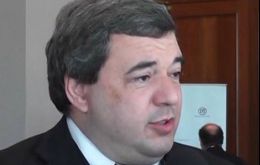
Uruguay’s changes in the monetary policy regime as announced last week are unlikely to address the country’s inflation problems points out Capital Economics in its latest report emphasizing that a tighter economy policy and reduction of wage indexation remain the main challenges to keep within the 5% target.
-
Monday, June 10th 2013 - 14:08 UTC
Brazil JBS becomes largest chicken producer; purchases main tannery in Uruguay

Brazil’s JBS SA, the world’s largest beef producer, agreed to buy assets from Marfrig Alimentos SA in Brazil and Uruguay, which will make it the world’s largest chicken producer. JBS will take on 5.85 billion Reais (2.74bn dollars) in debt for the Seara poultry and pork unit in Brazil and the Zenda tannery unit in Uruguay, the Sao Paulo-based company said in a regulatory filing today.
-
Friday, June 7th 2013 - 05:40 UTC
Uruguay tightens terms for the inflow of short-term capital inflows
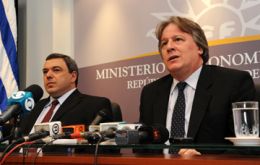
Uruguay announced on Thursday new measures to discourage short term speculative capital inflows that have appreciated the Peso, eroded the country’s international competitiveness, made imports cheaper than domestic production and threaten an already stubborn inflation.
-
Wednesday, June 5th 2013 - 19:21 UTC
Uruguay former president calls on Latam to advance in agreements with the US
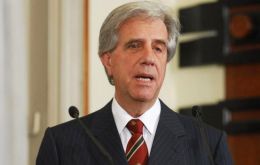
“The time for rhetoric exercises has run out”, said Uruguayan former president Tabare Vazquez during a presentation before the Latin American Studies Association, LASA, in Washington where he emphasized the need for Latinamerican countries to advance in agreements with the United States.
-
Wednesday, June 5th 2013 - 17:49 UTC
Uruguay ‘can’t ignore (Mercosur) reality’ and is applying for full Pacific Alliance membership
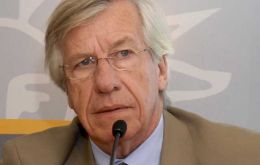
Vice-president and acting president Danilo Astori strongly defended the Uruguayan government’s intention of joining the Pacific Alliance, next to Chile, Colombia, Peru and Mexico, claiming that Mercosur has fallen into a state of ‘inactivity’ but also rejected point blank statements from Brazilian diplomacy contrary to such a move.
-
Wednesday, June 5th 2013 - 12:19 UTC
Two Chinese jiggers quarantined 12 kilometres off Montevideo following mysterious deaths
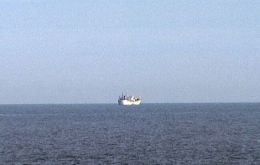
Two Chinese jiggers are in quarantine 12 kilometres off the port of Montevideo following the death of two crew members and the hospitalization of another two in separate incidents.
-
Wednesday, June 5th 2013 - 08:05 UTC
Inflation in Uruguay falls for the fourth month running but still above target
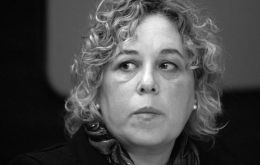
Consumer prices in Uruguay during May increased 0.32% and 8.06% in the last twelve months which is still above the annual top target range of 6%, but on the positive side for the fourth month running inflation has been decreasing, according to the latest release from the stats office INE.
-
Wednesday, June 5th 2013 - 07:56 UTC
Falklands: Uruguay lawmaker calls for direct links with ‘kelpers’ and a change in government’s policy
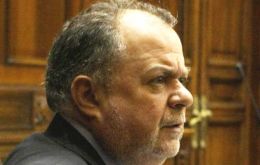
Lawmaker Jaime Trobo invited his peers in the Lower House to review the Uruguayan government’s position regarding the Malvinas Islands and without questioning Argentine sovereignty, establish close trade and human links with the Islanders, as in the past, eliminating the ‘sanitary ring’ imposed by the current Argentine government.
-
Tuesday, June 4th 2013 - 07:00 UTC
Mujica calls on Spain for a more active role in the EU/Mercosur trade discussions
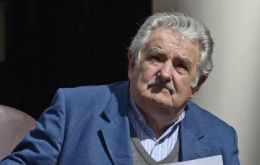
Uruguayan president Jose Mujica called on Spain for a more decisive role in the trade and cooperation agreement discussions between Mercosur and the European Union which have been going on for over a decade.
-
Tuesday, June 4th 2013 - 05:07 UTC
Uruguayan forestry company buys turbines for a 90 MW wind farm
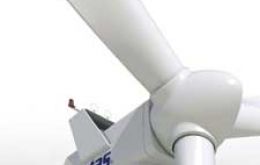
Denmark’s Vestas Wind Systems wind-turbine maker received a 90-megawatt turbine order from Compañia Forestal Uruguaya SA for the Pintado power plant in south centre Uruguay. The 30 3-megawatt turbines project will be serviced by the company for 15 years and the farm is expected to be operational by the second quarter of next year.
